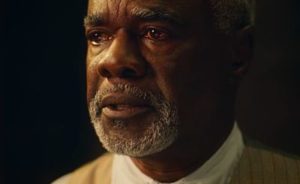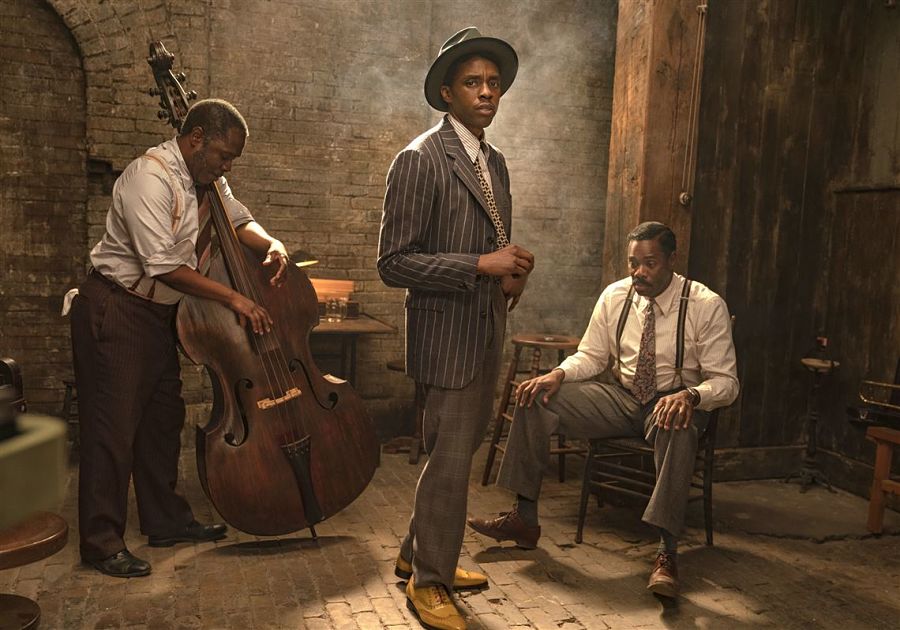August Wilson’s plays, and his distinctive playwriting voice, weren’t just inspired by music. They were also sparked by musicians, specifically ones he knew and hung with in his formative years in Pittsburgh’s Hill District. He once told me, of his inspiration for the characters in Seven Guitars, that he “knew guys like this on the street corners, and I wrote little scenes that were 10 minutes in length, some of them, of guys playing guitars, arguing about what corner who’s gonna play on.” He then described an image “of an orchestra of guitars with seven guys arguing about who’s gonna sit in what chair. There are all these empty chairs, and the guy comes up and says, ‘You’re in my chair.’ ‘But Mr. Johnson told me to sit here.’ And they get in an argument, the guy pulls a knife on him.”
That last turn should remind anyone who knows Wilson’s plays of the denouement of Ma Rainey’s Black Bottom, in which a seemingly petty dispute among 1920s-era musicians, after a tense but triumphant recording session as the title character’s band, abruptly turns violent. And a recent interview with the actors who play the bandmates in a great new film of the 1982 Wilson play, already in some theatres and debuting on Netflix on Dec. 18, gave me a taste of what some of those street-corner bull sessions among fellow craftsmen must have been like.
The joking and jostling was nearly constant, especially at the running commentary provided by Glynn Turman, a Wilson veteran who in the film definitely plays the philosophical pianist Toledo, and whose experiences in the acting trade give him a vantage point comparable to that of the film’s Ma Rainey. Just as she fights fiercely to preserve her dignity and worth in a white man’s business, I asked the assembled actors if they had ever struggled to assert a sense of ownership and self-possession in a field that has diversified somewhat but is still predominantly white-run. Replied Turman, “One of my favorite lines comes from a friend of mine, Ted Lange, who says, ‘When you think you’re screwing them, and they know they’re screwing you, everybody’s happy.’”
Though it was over Zoom from three different locations, the convulsive laughter at that cynical maxim from Turman’s colleagues, Colman Domingo (who plays the diplomatic trombonist Cutler) and Michael Potts (the self-effacing bassist Slow Drag), came hard and lasted long. It was rivaled only by their response to another Turman-ism, on the same theme: “My saying always is: ‘Put the knife in a different hole in my back, please—don’t put it in the same hole.’ ”
It was after that moment of clarifying levity that Domingo—who came to prominence in the cast of Passing Strange but has since become a force on his own, writing the plays Dot and Wild With Happy—added, on a more serious note, that he’d definitely been in situations where he felt his voice had been “silenced in some way” for asking questions like, “Am I the only one who recognizes that everyone in this room, on this creative team, is white?” An accomplished playwright and director as well as an actor, Domingo said he’s grown “more vocal about that kind of thing now, because I feel like you’ve got to put your ass on the line. That’s what people like Ma and Levee did for us. That’s why we’re all here.” Nodding to Turman, he said, “This gentleman here has been in this industry for a very long time, and I’m sure he’s taken some knocks to make sure things are better for us. So we have to do the same.”
Potts—last seen on Broadway in The Prom, as well as Wilson’s Jitney—was even more direct, saying, “It’s about demanding your worth, knowing that you’re often valued less than a white artist. You have to say, ‘No, this is what I want. This is what I need. This is what I’m worth, and I won’t take any less than that.’ This is what Ma lives out in this movie: ‘I’m not gonna take a penny less, and no, getting me a Coca-Cola is not going to kill you.’ That’s certainly something that I deal with.”
There was one actor absent from this collegial band reunion: Chadwick Boseman, who gave his extraordinary final performance as Levee, a brash young trumpeter with talent to burn and ambition to match it, who chafes at the job of mere service to Ma Rainey’s music—or, as he calls it, “this jug band shit.” Boseman died of cancer at age 43 just a few months ago, and the assembled actors recalled his time on set fondly.
“The wildest thing,” said Domingo, “is there’s a dichotomy about Chad. He had so much size and presence and impact on culture—it’s meteoric—but to watch Chad walk into a room, he was the most quiet, graceful, gentle presence. He’s not walking in with a large personality. He’s walking in as a workman; he’s interested, he’s questioning, he’s doing the work. But then you see all that he puts in there, and the impact is huge.”
Potts spoke of Boseman’s “grace and elegance, and in everything, and a warmth and generosity of spirit. And a slyness as well.”
Unsurprisingly, Turman picked up this last theme. Though Toledo and Levee enact the most opposition in the film, in real life the two actors bonded over “a lot of things that had nothing to do with the play. He was into a lot of things, including drumming and other instruments he played. He had lightness about himself.”

He could also bring the thunder, as in Levee’s harrowing testimony of his mother’s rape at the hands of a group of white men when he was just eight, his desperate attempt to defend her, and the effect it all had on his father. It’s a moment that stops the play dead, as his bandmates realize that Levee isn’t as green and untested as he may seem. It is then that Turman has one of the film’s signature moments: a monologue, delivered from the piano, analogizing the African Diaspora to a stew, which concludes shatteringly: “See, we’s the leftovers. The colored man is the leftovers. Now, what’s the colored man gonna do with himself? That’s what we waiting to find out.” The tears that well in Turman’s eyes tell the story as much as Wilson’s words do, and I wanted to know more about that moment.
“That’s really George’s concoction, the way he placed it,” Turman said, referring to director George C. Wolfe (the screen adaptation is credited to Ruben Santiago-Hudson). Indeed, in Wilson’s play, the speech emerges from a lighter moment and plays as yet another of Toledo’s unsolicited, even unwelcome pontifications about life. When Turman played the role onstage, at L.A.’s Center Theatre Group, four years ago, that speech felt entirely different, he said. In the Ma Rainey film, “When I opened my mouth, it came out in a blues song, and I just went with it.” Wolfe later intercut shots, essentially filmic portraits, of everyday Black folk “in different forms of solitude,” as Turman put it. “He made a tapestry out of that moment that surprised even me.”
After Turman joked about the poor luck of having to “follow one of the greatest monologues ever given,” Domingo countered with some quiet, heartfelt praise for his elder. “You follow that with the truth that only you can do, Glynn,” said Domingo. “What’s in your eyes is history, things seen and felt, things explored. I bow down to you.”
Clearly there is honor among artists, as well as humor and rivalry. It seems only fitting that Wilson’s plays, having been with us for nearly four decades, and which gave vivid, unmistakably theatrical voice to Black history of the last century, have accumulated their own history and tradition. As Ma Rainey tells Cutler about the blues: “I ain’t started the blues way of singing. The blues always been here.”


